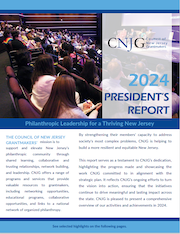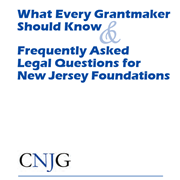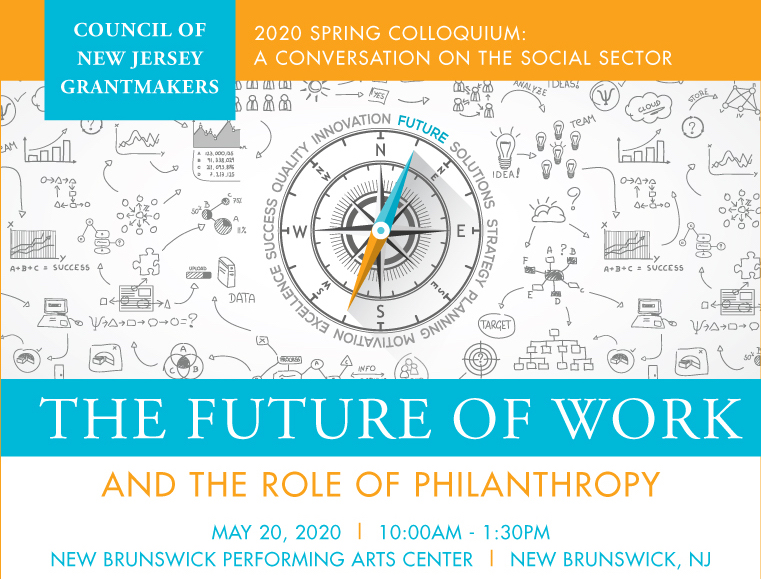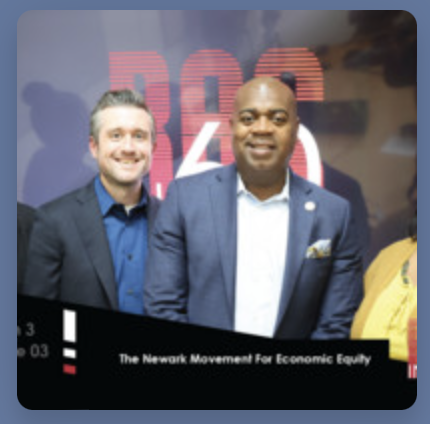Site Search
- resource provided by the Forum Network Knowledgebase.
Search Tip: Search with " " to find exact matches.

CNJG's President's Reports

This guide was designed to help the state’s philanthropic community understand their ethical, legal, and fiduciary requirements and obligations.
In 2004, a group of foundations came together to create a funder collaborative in support of Freedom to Marry’s state-by-state strategy to win marriage equality. Over the following 11 years, this unique collaborative and its funding partners invested a total of $153 million to support a wide range of activities across the country to change hearts and minds on a massive scale — and ultimately to deliver a historic win for equality and love.
A new case study and video tell the untold, behind-the-scenes story of this funder collaborative — how its members worked with movement leaders to develop a strategy for winning, how they persevered in their support despite enormous setbacks, and how they invested in the opinion research, state-by-state grassroots action and litigation that pushed marriage over the finish line from coast to coast. As the Civil Marriage Collaborative closes its doors in 2015, the case study and video also draw lessons from this historic victory for foundations supporting other social justice causes.
How the government can partner with impact investors to unleash new capital, talent and energy for maximum impact.
The Future of Work and the Role of Philanthropy
Date: This event has been postponed.
After much consideration and in light of the ongoing spread of coronavirus, CNJG has decided to postpone the 2020 Spring Colloquium, entitled The Future of Work and Philanthropy’s Role.
This was a difficult decision, but the health and safety of attendees and staff are of the utmost importance at this time. It is especially significant because our communities--and indeed our state--rely so heavily on the services and programs made possible by New Jersey’s foundations and charitable organizations. We do not want to do anything that could impede the good work being done by our philanthropic and nonprofit staff, leaders and stakeholders.
We are tremendously grateful to PSEG, our Signature Sponsor, for their continued support, and thank the CNJG Program Committee for their thoughtful guidance and ongoing assistance.
Community colleges offer greater affordability than private or state colleges, are adept at providing flexible education schedules and delivery, and are often deeply tied to the local areas in which they reside. This type of accessibility and inclusivity provides enormous opportunities for students left out of traditional higher education models. And while there is a road to recovery for community colleges post-COVID, they can play a critical role in building a future workforce in local communities and creating a more equitable higher education system for New Jersey students.
During this program, we’ll hear from several community college leaders on the impact of the pandemic on enrollment and learning, the biggest challenges facing higher education right now, and the opportunities they see to close education gaps and improve student outcomes. Join us to learn more about community colleges as a pathway to success for students in New Jersey, and philanthropy’s role in supporting more accessible, affordable, and flexible higher education models.
Speakers include:
Brian Bridges, Ph.D., Secretary of Higher Education, State of New Jersey
Dr. Michael Gorman, President, Salem Community College
Steven M. Rose, President, Passaic Community College
Cost: Free for CNJG Members; $50 for Non Member Grantmakers.
This program is only open to staff and trustees from grantmaking organizations.
Webinar Video
The Newark Philanthropic Liaison is a unique partnership between the Council of New Jersey Grantmakers and the City of Newark, supported by several foundations. Read more about the Liaison’s work In these reports. Due to several transitions, there were no written reports between 2015 and 2022.
What comes after “strategic...?” If you said, “planning,” you’re not alone. And for many leaders of community foundations, especially small ones who don’t have the time or money for a big process, anxiety is the feeling that follows. If that’s the case, this guide is for you.
It invites you to test-drive some activities to bring your current program, operations and community leadership strategies into focus before you decide whether to create a plan or not. It helps you discover ongoing strategic practices and decide whether to keep them or not. If you already have done a strategic plan, and it is languishing on a shelf, this guide will help you refresh it.
PART A: Good Strategy Takes Practice (Not Just Planning)
PART B: Do Your Discovery
PART C: Jumpstart Your Strategy Narrative
PART D: Bring It Together
Looking To What’s Next
President Obama's Hurricane Sandy Task Force released this rebuilding strategy to serve as a model for communities across the nation facing greater risks from extreme weather and to continue helping the Sandy-affected region rebuild. The Rebuilding Strategy contains 69 policy recommendations, many of which have already been adopted, that will help homeowners stay in and repair their homes, strengthen small businesses and revitalize local economies and ensure entire communities are better able to withstand and recover from future storms.


